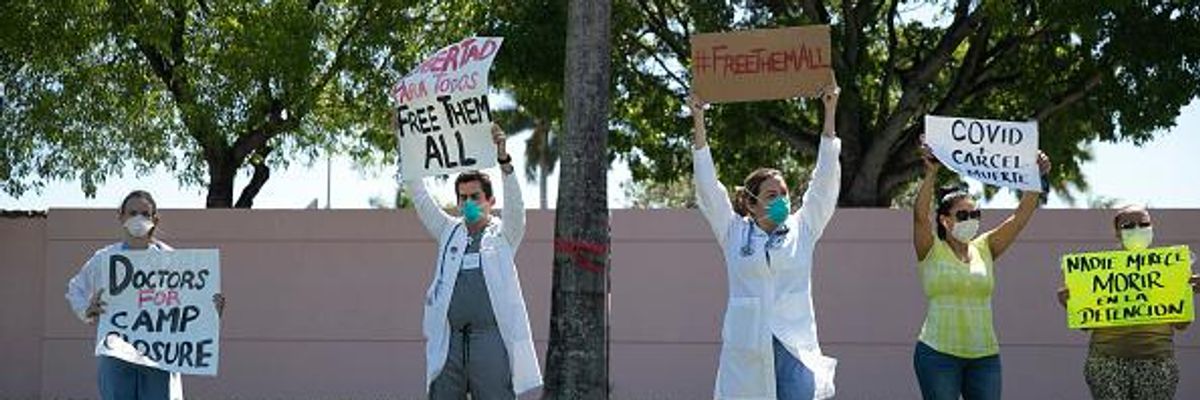The American Friends Service Committee and several other groups have planned several consecutive days of actions beginning Tuesday, during which opponents of mass incarceration will mobilize in communities across the U.S. to demand people be released from prisons, jails, and immigration and juvenile detention centers.
As "a Quaker organization with more than a century of experience working to end militarism and violence," the AFSC is opposed to "punitive approaches" to public safety, which it considers "dehumanizing and harmful," and at odds with its goal of moving "toward a more peaceful world."
In a statement, the AFSC explained its preference for pursuing policies that "actually work to interrupt and prevent cycles of violence, end harm, and provide access to tools to ensure everyone's well-being," noting the organization's desire to see resources shifted away from "incarceration in all forms" and toward "institutions our communities most need... to thrive"
According to the AFSC, the U.S. carceral system is an unjust institution that violates the dignity and rights of 2.3 million people, disproportionately poor people and people of color, who are imprisoned with inadequate access to healthcare and other resources. Furthermore, despite having the highest incarceration rate in the world, the U.S. continues to experience "incredibly high rates of gun violence and sexual assault," meaning that "warehousing" millions of people is an ineffective crime deterrent that does "little to stop harm or help survivors of violence and communities heal."
"If incarceration stopped violence, the U.S. would be the safest country in the world," said Lewis Webb, coordinator of the AFSC's Healing Justice program. "Instead, we have 2.3 million people in cages while our communities lack access to quality healthcare, education, employment, addiction, and mental health services, and an approach to justice that actually addresses the root causes of violence. We believe another approach isn't only possible, but absolutely necessary for the well-being of our communities."
Kristin Kumpf, AFSC's director of human migration and mobility, explained that "thousands of people are in immigration detention--including people who recently came to the U.S. seeking asylum and those who have lived here with their families for years before getting caught up in the Trump administration's cruel immigration policies." She added, "We are calling on Immigration and Customs Enforcement (ICE) and Customs and Border Protection (CBP) to immediately release everyone in their custody."
While the AFSC seeks to shrink the carceral system and transform public safety in general, it made the case that the coronavirus pandemic renders imprisonment particularly deadly and strengthens the impetus for change. To date, there have been more than 176,000 positive cases among incarcerated people as well as staff--and at least 1,000 people have died, according to a statement shared by the organization.
The group explained that "both infection rates and death rates are much higher" inside carceral facilities, where "the nature of confinement makes it almost impossible for people to practice social distancing, and inadequate healthcare and limited sanitation supplies help Covid-19 spread"--conditions that Common Dreams reported on last week.
In a video urging viewers to join the call to #FreeThemAll, the AFSC described how the pandemic multiplies the dangers of incarceration, "making every sentence a potential death sentence" and "turning every cell and cage into a potential death chamber."
For all of these reasons, the AFSC and over a dozen partner organizations are asking people to safely participate in the national days of action that kick off Tuesday evening to demand local, state, and federal leaders:
- Release people from prison. Expand and expedite compassionate release, parole, commutation, and early release mechanisms so that elderly people, people who are medically vulnerable, and others who might be eligible for release can return to their homes as quickly as possible. Ensure that everyone has the opportunity for freedom.
- Release everyone held on bail or bond in pretrial detention.
- Release everyone held in ICE and CBP custody.
- Release everyone held in juvenile detention and youth held in adult facilities. Remove all police from schools.
- Ensure that both incarcerated people and staff have access to free Covid-19 testing and other essential medical services. Waive copays for medical visits, care, and prescriptions. Ensure all incarcerated people and staff have access to accurate and up-to-date health information. Provide free access to cleaning supplies including soap, CDC-recommended hand sanitizer, and protective equipment to all people in custody.
- Take all measures to ensure that people have access to legal representation, legal information, and the courts, even in cases where movement is restricted.
- Provide access to essential services--healthcare, mental health treatment, housing, and food--for people released from incarceration so they have the tools they need to stay healthy and safe on the outside.
- End immigration enforcement actions, including deportations, and defund ICE and CBP.
- Defund the police.
- Invest in community-based, community-controlled resources that truly keep us safe--education, housing, healthcare, addiction and mental health treatment, jobs, and job training, environmental protections, food access, meaningful reentry support, and restorative and transformative forms of justice that address the root causes of harm and violence.
The AFSC noted that those unable to attend an event in-person can still take action online if they choose by telling their governor, ICE, and the Bureau of Prisons to protect people in prisons, jails, and detention centers from Covid-19 by releasing as many incarcerated people as possible.
The events coincide with the 49th anniversary of the Attica uprising, when more than 2,000 people incarcerated in upstate New York occupied the prison yard to demand access to education, medical care, wages, and more.
A list of actions by state can be found here.

